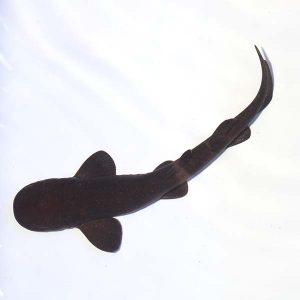
The Short Tail Nurse Shark naturally occurs from the Western Indian Ocean, found in shallow water and coral reefs along the coast of Africa from Tanzania to Kenya and around the island of Madagascar. It is recognized as the smallest member of the Nurse Shark Family. This tropical species is well-adapted to life on the coral reef boasting a tough skin that is advantageous when navigating in and around rough coral structures. The Short Tail Nurse Shark can survive for many hours out of the water, perhaps an adaptation to receding water levels during low tide.
The Short Tail Nurse Shark is considered an “expert only” animal. Provide an established, well filtered, and highly-oxygenated aquarium 200 gallons or larger in size with pristine water conditions. House with carefully chosen tank mates to ensure long term success. Provide the Short Tail Nurse Shark, a low-stress environment with limited disruption and never expose it to copper-based medications. The Short Tail Nurse Shark is nocturnal, meaning it is primarily active during the night. This slow-moving shark is typically not very active, often occupying its time sitting on the bottom or taking refuge in “caves” or crevices during the day. Interestingly, the ORA Captive-Bred Short Tail Nurse Shark will often rest on its side or even upside down for an extended period of time!
The Short Tail Nurse Shark has a hearty appetite and should be feed the freshest foods possible offered when the shark is naturally active, typically around dawn and dusk. If the Short Tail Nurse Shark is observed roaming the aquarium during daytime hours, it needs to be fed more.
The diet of the Short Tail Nurse Shark should consist of small pieces of cleaned, vitamin-enriched fresh fish, raw squid or shrimp, scallop, and clam.

